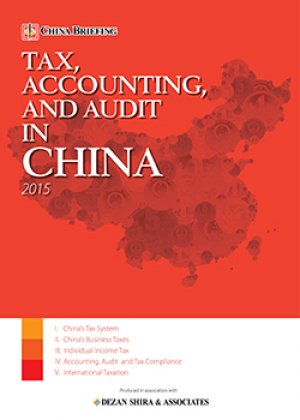China Regulatory Brief: Consumption Tax Reform, VAT on Financial Services, Support for Cultural Enterprises
China Cancels Four Consumption Taxes Starting December 1
On November 25, the Ministry of Finance (MOF) and State Administration of Taxation (SAT) jointly released the “Announcement on Adjusting Consumption Tax Policies (Cai Shui [2014] No.93),” which took effect on December 1, 2014. According to the Announcement, consumption tax has been removed for the below items:
- Alcohol;
- Automobile tires;
- Automobile leaded gasoline; and
- Small displacement motorcycles with a cylinder capacity of less than 250 ml.
Meanwhile, consumption tax of three and 10 percent will continue to be levied on motorcycles with a cylinder capacity of 250 ml and 250+ ml, respectively.
China to Launch VAT on Financial Services
China’s Ministry of Finance recently announced that the country is looking to expand its current value-added tax (VAT) reform to include financial services from early next year. It is widely expected that a VAT rate of either 6 or 11 percent will be levied on insurance premiums, but reportedly the rate could go as high as 16 percent. It has been confirmed that the VAT pilot scheme will fully extend to the financial sector by January 2016, which may also mark the end of several years of VAT reform for China. At the start of 2012, China launched a massive reform to replace its business tax (BT) with VAT, two of the country’s now three major indirect taxes. China has yet to confirm more details regarding the VAT rate on financial services, as well as the inclusion of the construction, real estate and “lifestyle services” sectors in the VAT reform.
![]() China’s VAT Reform to be Extended to Telecom Sector
China’s VAT Reform to be Extended to Telecom Sector
China Encourages Foreign Investors to Provide Elderly Care Services
On December 2, the Ministry of Commerce (MOFCOM) and Ministry of Civil Affairs (MCA) jointly released Circular No. 81, which encourages foreign investors to set up for-profit, wholly foreign-owned nursing homes or operate cooperative joint ventures with a Chinese partner. Investors are also encouraged to develop high-quality chain institutes and help deepen the reform of state-owned elderly care institutions. Those seeking to set up for-profit elderly care institutions are required to submit application materials such as an application form and Articles of Association to the provincial administrative authorities. The Circular stipulates that foreign nursing homes are entitled to the same preferential taxation policies as those owned by domestic investors.
![]() Golden Years: The Coming Investment Boom in China’s Elderly Care Industry
Golden Years: The Coming Investment Boom in China’s Elderly Care Industry
China Further Supports Cultural Enterprises with Preferential Tax Policies
The MOF recently released the “Announcement on Continuing to Implement Tax Policies in Support of the Development of Cultural Enterprises,” which clarifies that income derived by film companies through the sale of films, transfer of film rights, distribution of films and projection in rural areas shall be exempt from VAT; companies engaging in encouraged cultural industry projects and importing equipment (for personal use only) that cannot be produced domestically in China shall be exempt from import tariffs; eligible cultural enterprises recognized as new high-tech enterprises shall receive a reduced corporate income tax (CIT) rate of 15 percent; and R&D expenses for developing new working methods and new products can enjoy additional pre-tax deductions. The Announcement will last until December 31, 2018.
|
Asia Briefing Ltd. is a subsidiary of Dezan Shira & Associates. Dezan Shira is a specialist foreign direct investment practice, providing corporate establishment, business advisory, tax advisory and compliance, accounting, payroll, due diligence and financial review services to multinationals investing in China, Hong Kong, India, Vietnam, Singapore and the rest of ASEAN. For further information, please email china@dezshira.com or visit www.dezshira.com. Stay up to date with the latest business and investment trends in Asia by subscribing to our complimentary update service featuring news, commentary and regulatory insight. |
 Tax, Accounting, and Audit in China 2015
Tax, Accounting, and Audit in China 2015
This edition of Tax, Accounting, and Audit in China, updated for 2015, offers a comprehensive overview of the major taxes foreign investors are likely to encounter when establishing or operating a business in China, as well as other tax-relevant obligations. This concise, detailed, yet pragmatic guide is ideal for CFOs, compliance officers and heads of accounting who must navigate the complex tax and accounting landscape in China in order to effectively manage and strategically plan their China operations.
 Annual Audit and Compliance in China
Annual Audit and Compliance in China
In this issue of China Briefing, we discuss annual compliance requirements for foreign-invested enterprises, including wholly-foreign owned enterprises, joint ventures and foreign-invested commercial enterprises, as well as the less demanding requirements for representative offices. We also highlight the most recent tax and legal changes that will significantly influence the way companies do business in China in 2014.
 Revisiting China’s Value-Added Tax Reform
Revisiting China’s Value-Added Tax Reform
In this issue of China Briefing Magazine, we review recent steps taken by the Chinese government to reform its value-added tax policy. Specifically, we examine the sectors covered by the new Pilot Reform program with a focus on tax rates, taxpayer status and the calculation of VAT. We also include a VAT Pilot Reform Rates Chart, which overviews each affected industry’s tax rate and VAT exempted services.
- Previous Article Come e quando assumere stagisti in Cina
- Next Article China Law Trends in 2015










